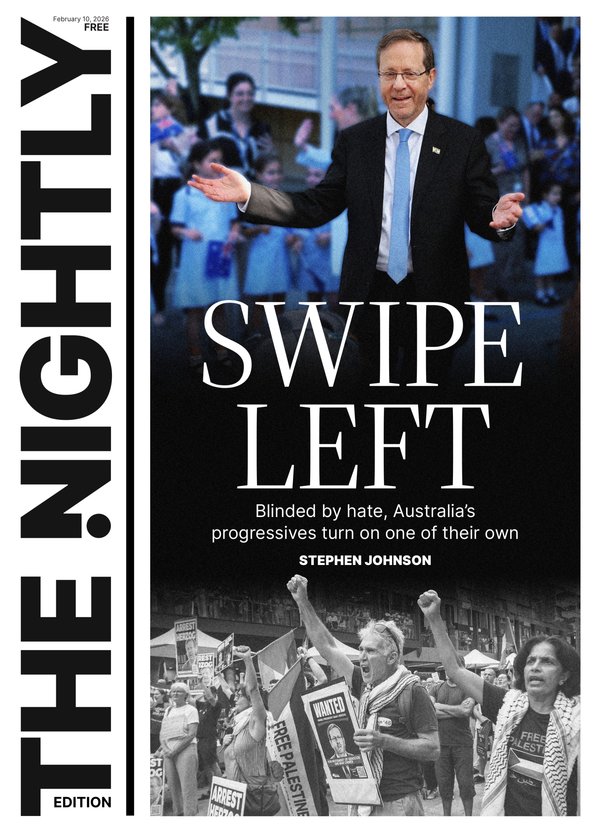KATE EMERY: Our diets are rubbish, and though eating well is simple, it is far from easy
KATE EMERY: The reality is that most Australians aren’t eating enough fruit and vegetables and we’re eating too many so-called ‘discretionary’ foods.

If you thought you might go your whole life without hearing the word “hamburger” and the name Sisyphus in the same sentence, hold onto your toga.
In Greek mythology, Sisyphus was a king punished for crimes against the Gods by being sentenced to spend eternity in the underworld rolling a boulder up a hill, only for it to roll back before he could reach the top — a curse that’s not a world away from some office jobs I’ve had.
Sisyphean is how I would describe what the good people at the National Health and Medical Research Council are up to right now as they grapple with a review of Australia’s dietary guidelines, the results of which are expected in 2026.
Sign up to The Nightly's newsletters.
Get the first look at the digital newspaper, curated daily stories and breaking headlines delivered to your inbox.
By continuing you agree to our Terms and Privacy Policy.Not because the work is not important but because they must know how much of an uphill battle they face convincing Australians to put down the Whopper and pick up the broccoli.
The national dietary guidelines are more than just something we should all feel guilty about.
They are intended to cut through the noise, to weigh the scientific evidence on health and nutrition and come up with advice for Australians who want to live healthy lives.
If you’ve ever stared at two contradictory news stories, one assuring you that a glass of red wine will help you live long enough to see grandkids lose their hair and teeth and the other promising that same glass will kill you before you hit menopause, you know how valuable that can be.
This latest review of the guidelines is expected to take on not just the scientific research into diet and good health but to look more seriously at the sustainability of what we eat and the impact on the world’s climate.
The guidelines don’t always work exactly as they’re supposed to for a bunch reasons, only one of which is that a bar of Dairy Milk just sounds better at 3pm than a side salad ever will.
For one thing, the formation of the guidelines can be influenced by special interest groups, including farmers who tend to take a dim view of advice to eat less red meat when they’ve got a paddock full of steaks.
For another, the experts are fighting against not just greed and increasingly time-poor lives but social media, where charlatans make a living flogging “superfood powders” or convincing the gullible that a coffee enema twice a day is the secret to longevity.
Meanwhile, the Dairy Milk v salad war is both real and being lost.
The reality is that most Australians aren’t eating enough fruit and vegetables and we’re eating too many so-called “discretionary” foods, which is a polite way of saying “junk food” — a term nobody wants to use anymore for reasons that probably have something to do with that industry influence I mentioned.
Our diets aren’t rubbish just because we’re a bit greedy, lazy or trying to squeeze in a supermarket run between school pick-up and netball drop-off. It’s also because the background noise around what we should and shouldn’t be eating can be tremendously loud.
A trip to the supermarket, at times, feels like it requires a PhD in dietetics just to decide which brand of margarine or butter to buy, as you compare the benefits of plant sterols to a half-remembered fact about a cow feed additive used by some butter manufacturers that either causes cancer or cures it.
The current guidelines, released in 2013, are nuanced. But the fridge magnet version (that’s not a line, I’m literally reading this off a fridge magnet) boil down to recommending people eat plenty of (mostly wholegrain) carbs and veggies every day, a little less lean meat, fish, dairy and fruit and to eat fast food, processed meat and things like biscuits and alcohol only sometimes and in small amounts.
Basically all the stuff your mum and grandma would probably tell you if you put down your superfood smoothie and bulletproof coffee long enough to ask.
Some time next year the NHMRC will deliver its latest set of guidelines, knowing that somewhere under five per cent of us will meet them. Like I said at the start: Sisyphean.
But it’s important to remember that Sisyphus really hung in there with that boulder, despite knowing he would fall short.
We should be grateful that the NHMRC are doing the same and perhaps adopt the same aim for ourselves: striving towards perfection, falling short and dusting off the sugar crumbs to try again tomorrow.
